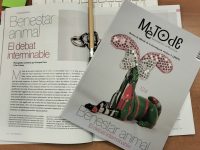|
An article published in March 2015 in Science informs of the oldest human fossil. This discovery further fleshes out the place and time of the separation of the Homo genus from the rest of primates: Ethiopia, 2.8 million years ago. A climate change extremely reduced the forests where they lived and the path of evolution branched off: many were confined in the pockets of remaining forest (which, by the way, are still only a few today) and only a few jumped to the ground to risk a new and open landscape (which, by the way, are many today). The change for those who left paradise was hard. In paradise everything abounds and everything takes little effort. It was enough to extend an arm to reach a fruit or a small animal. However, at ground level everything is a problem. The animal protein is in huge bodies that flee at impossible speeds and, moreover, we have to fight a great variety of experienced and fierce carnivores for it. On the other hand, vegetal protein abounds at ground level, yes, but it is necessary to dedicate a lot of time, to travel long distances and to invest a lot of energy in order to live off of it. Outside of paradise effectiveness and efficiency start to matter. Today we know that the solution was to access an intelligence with which to anticipate uncertainty. But how did they access it? In order to survive in an open landscape, the monkey had to indeed make itself quickly and progressively effective and efficient. Standing as the Australopithecus afarensis did was the first milestone to see the predators coming with enough time to stay out of harm’s way. But what was the incentive to stand up before having an intelligence to recommend such a thing? Was it simply natural selection or was there some other special incentive? Was there some kind of prize or punishment as an answer to the pressure that suddenly started to demand effectiveness and efficiency? I suggest as a possible answer something we might well call the lever delight. It consists of a mental delight that ensues when we perceive that an almost negligible cause tends to have an almost infinite effect, that is, when we notice that a tiny effort has a major reward, like for instance the pleasure that lifting a heavy cart with the help of a lever produces: a well calculated supporting point is enough so that a little action is can overcome a lot of resistance. A brain gifted with this criterion for delight may well start searching for carrion and maybe end up writing poems. Our current life is full of achievements motivated by the lever delight: accelerating or braking a car with the gentle pressure of a foot, making a tennis ball move at 200km per hour with a simple hit of a racquet, causing an ovation or imposing silence with a minimal gesture, taking down an animal of several tons by pulling a trigger… The lever delight involves effectiveness (to achieve a result), but above all it rewards extreme efficiency (when the result is attained with minimal resources). The idea is reminiscent of a way to generate order from chaos in physics: a minimum variation of the initial conditions dramatically determines the future of a system. The bipedalism of the Australopithecus afarensis was rewarded with a clear lever delight: it made them stop crawling among the tall grass and stand on their hind legs in up to 120 cm of height, and thus the horizon of a few centimetres from their faces changed into a panoramic view with a horizon of 4 km. Another event of human evolution was the discovery of tools by the Homo habilis; the lever delight of an homidid for using a stone to reach the bone marrow of a large femur had to be historic too: a single hit instead of spending hours gnawing the bone. It is not difficult either to imagine the lever delight of the Homo erectus using fire to cook, defend himself or temper his weapons, or of the Homo neanderthalensis mastering language or of the Homo sapiens discovering the powerful abstract symbol and the alphabet itself with which they now produce sublime poems by combining less than thirty letters. Jorge Wagensberg. Tenured lecturer of the Department of Fundamental Physics. University of Barcelona (Spain). |
 Jorge Wagensberg Jorge Wagensberg |
Search
© Mètode 2015 - 85. Online only. Living with climate change - Spring 2015
Jorge Wagensberg
Professor at the Department of Fundamental Physics. University of Barcelona (Spain).





